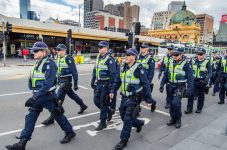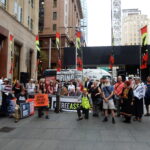Should Police Have to Justify Searching People?

In New York, police officers will soon be required to hand out cards titled ‘what is a stop?’ to those that they stop and search, but do not arrest..
The laws will come into effect on 21 September 2015, and are intended to reduce the incidence of ‘racial profiling’ – whereby police stop and frisk people based upon their race – and to reduce unjustified searches generally.
The cards will explain the law when it comes to searches, the basis for the search, and identify the police officer’s name, number and rank.
Police will need to tick one a reason for the search, such as having a reasonable suspicion that the person was in possession of weapons or drugs.
The lawyer who recommended the changes, Peter Zimroth, said:
“In focus groups and in conversations with individual officers about stop, question and frisk, we have heard a consistent message: the officers want more guidance and instruction about what they can and cannot do under the law.”
There are also new guidelines to make the law clear to police, which will state that:
“The officer must be able to articulate specific facts establishing justification for the stop; hunches or gut feelings are not sufficient.”
The move follows a class action in 2013 where African-American and Hispanic men provided evidence that they were being unfairly profiled and discriminated against by the NYPD.
The Presiding Judge found in favour of the men, strongly recommending reforms to stop and frisk procedures.
What is the Law in NSW?
Section 21 the Law Enforcement (Powers and Responsibilities) Act 2002 (NSW) (the “LEPRA”) says that police can only stop and search someone if they have a “reasonable suspicion” that he or she:
(a) is carrying a weapon,
(b) is carrying something used to commit an offence,
(c) has a dangerous article in a public place, or
(d) has a prohibited plant or prohibited drug .
Is Racial Profiling a Problem in Australia?
Many studies have shown that racial profiling is rife in Australia.
Indeed, the problem of racial profiling indigenous people is so common that criminal lawyers have coined the phrase “the trifecta”; which describes the situation where police aggressively confront an indigenous person – or otherwise vulnerable person – for a minor infraction such as ‘offensive language’, creating an altercation which leads to additional charges of ‘resisting police’ and ‘assaulting police’.
Studies have found that police are far more likely to approach indigenous people than others for minor offences like offensive language, and that their manner of confrontation is more aggressive.
In Victoria, the case of Haile-Michael and Others v Commissioner of Police and Others [2012] FCA 108 involved six African-Australian who men brought a case before the Federal Court for being repeatedly stopped, questioned and searched without justification.
One of the complainants, Daniel Haile Michael, gave stated that:
“I’ve experienced a police officer pulling me over three or four times a day, police officer confiscating my MP3 player because he assumed that it was stolen.”
A Melbourne University statistician testified that young African men are 2.5 times more likely to be stopped and searched by police in Melbourne’s inner suburbs.
The case was eventually settled after six years, with the Victorian Police Force issuing a joint statement that acknowledged the complaints of racial discrimination.
In response, Victorian Police introduced a receipt program in March 2015, whereby they are required to log the reasons for stopping and searching someone, but they are not required to identify the person’s ethnicity.
Will it be Effective?
In July, the two men at the centre of the 2013 Victorian case, Mr Haile Michael and Mr Issa, wrote a report on racism in policing for the Kensington Community Legal Centre.
They said they were “shocked” by the culture of racism amongst the police force – and the extent to which police would target, harass, intimidate, search and manhandle young African Australians. Released in August, the report recounts many instances of discrimination even after reforms made by the Victorian police force.
It remains to be seen whether issuing receipts or cards will prove to be an effective tool to reduce racial profiling. Perhaps it could be incorporated into a broader approach to stamp out the police culture of racial profiling and unjustified searches generally.






